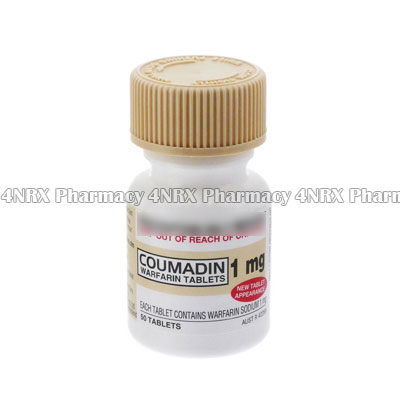 |
Home  Heart Heart  Coumadin (Warfarin Sodium) Coumadin (Warfarin Sodium) |
|
|||||||||
|
|
Coumadin (Warfarin Sodium)
What is Coumadin (Warfarin Sodium) used for? Coumadin (Warfarin Sodium) is an oral anticoagulant medication prescribed to prevent abnormal blood clots from forming, strokes from occurring, or pulmonary embolism. The medication reduces the action of platelets in the blood to prevent adhesion. This allows easier blood flow and prevents blockages in the blood vessels. Your doctor may prescribe this medication to be used along with others or for the treatment of other unlisted conditions, as well. How should I use Coumadin (Warfarin Sodium)? Coumadin (Warfarin Sodium) should be used strictly according to your doctor`s instructions to get the safest and most effective results from treatment. The typical dosage is one tablet administered once daily, but your individual directions will depend on your age, weight, current health, the condition being treated, and the severity of your symptoms. These should be swallowed with a full glass of water and may be taken on an empty stomach, although a snack or meal is suggested prior to use if you experience nausea. Do not change the form of the tablet by chewing or splitting the tablets as this may destroy or alter the effects of their contents. Ask your doctor or pharmacist any questions you have about the medicine to ensure the correct usage. What are the side effects of Coumadin (Warfarin Sodium)? Some patients using Coumadin (Warfarin Sodium) have reported experiencing side effects such as:
Serious side effects that may require immediate medical attention are severe headaches, dizziness, sensitive skin, easier bruising, numbness, muscle weakness, stomach pain, urinary retention, painful urination, darkened urine, or jaundice. Contact your doctor as soon as you encounter any worrying or intense symptoms to make sure the necessary adjustments are made to your dosage or application frequency to prevent more health problems from occurring. Please Note Coumadin (Warfarin Sodium) should not be used by patients who are pregnant, who have just given birth, after major surgery, or if you are actively bleeding. Also inform your doctor if you have a peptic ulcer, hypertension, increased risk of bleeding, bacterial endocarditis, decreased kidney function, or decreased liver function. These conditions may cause unexpected health problems requiring adjustments to your regimen. Strictly use Coumadin (Warfarin Sodium) as prescribed and follow all instructions provided by your doctor. Safe, suitable, and optimum dosage can vary and is dependent on the patient`s health and medical history, as well as the condition you are treating. Coumadin (Warfarin Sodium) may not be safe or suitable for all patients. Always ensure your doctor is informed if you are pregnant or breastfeeding, using any other type of medication (including non-prescription medicine, vitamins, and supplements), as well as if you have any allergies, other illnesses, or pre-existing medication conditions. Seek immediate medical attention or proceed to your nearest accident and emergency department if you suffer a hypersensitive or allergic reaction. Symptoms usually present during a reaction of this nature include difficulty breathing or swallowing, swelling of the limbs or face, tight chest, hives, and skin rashes. 
|
||||||||||||||||||